Beta Lactoglobulin Protein Market
Beta Lactoglobulin Protein Market Size and Share Forecast Outlook 2025 to 2035
Beta lactoglobulin protein market is projected to grow from USD 1,300.0 million in 2025 to USD 1,900.0 million by 2035, at a CAGR of 3.8%. Whey Isolate will dominate with a 55.0% market share, while sports nutrition will lead the application segment with a 45.0% share.
Beta Lactoglobulin Protein Market Forecast and Outlook 2025 to 2035
The beta lactoglobulin protein market stands at the threshold of a decade-long expansion trajectory that promises to reshape sports nutrition technology and clinical protein solutions. The market's journey from USD 1,300.0 million in 2025 to USD 1,900.0 million by 2035 represents substantial growth, the market will rise at a CAGR of 3.8% which demonstrating the accelerating adoption of advanced protein technology and nutritional optimization across sports nutrition facilities, clinical applications, and food processing operations.
The first half of the decade (2025-2030) will witness the market climbing from USD 1,300.0 million to approximately USD 1,573.8 million, adding USD 273.8 million in value, which constitutes 46% of the total forecast growth period. This phase will be characterized by the rapid adoption of whey isolate systems, driven by increasing sports nutrition volumes and the growing need for advanced protein solutions in clinical environments worldwide. Enhanced protein capabilities and automated processing systems will become standard expectations rather than premium options.
The latter half (2030-2035) will witness continued growth from USD 1,573.8 million to USD 1,900.0 million, representing an addition of USD 326.2 million or 54% of the decade's expansion. This period will be defined by mass market penetration of specialized protein technologies, integration with comprehensive nutrition platforms, and seamless compatibility with existing food processing infrastructure. The market trajectory signals fundamental shifts in how nutrition facilities approach protein processing and clinical applications, with participants positioned to benefit from growing demand across multiple source types and application segments.
Quick Stats for Beta Lactoglobulin Protein Market
- Beta Lactoglobulin Protein Market Value (2025): USD 1,300.0 million
- Beta Lactoglobulin Protein Market Forecast Value (2035): USD 1,900.0 million
- Beta Lactoglobulin Protein Market Forecast CAGR: 3.8%
- Leading Source Type in Beta Lactoglobulin Protein Market: Whey Isolate
- Key Growth Regions in Beta Lactoglobulin Protein Market: South Asia Pacific, East Asia, and Western Europe
- Top Players in Beta Lactoglobulin Protein Market: Fonterra, Arla Foods, FrieslandCampina, Glanbia, Lactalis
- Where revenue comes from - Now Vs Next (Industry-level view)
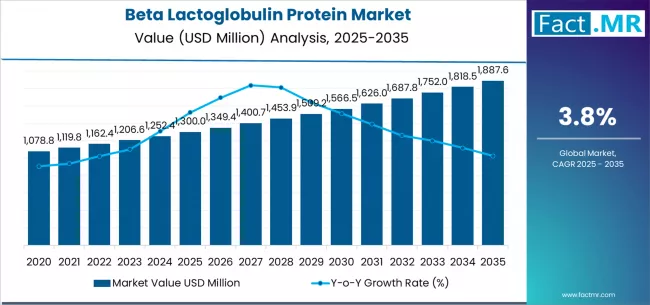
| Period | Primary Revenue Buckets | Share | Notes |
|---|---|---|---|
| Today | Whey isolate systems | 55% | Purity-driven, sports focus |
| Whey concentrate solutions | 35% | Cost-effective processing | |
| Other protein sources | 10% | Specialized applications | |
| Sports nutrition applications | 45% | Performance optimization | |
| Clinical/infant formulations | 30% | Medical requirements | |
| Food & beverage integration | 25% | Commercial processing | |
| Future (3-5 yrs) | Advanced whey isolate systems | 52-58% | Technology enhancement, purity gains |
| Concentrated protein solutions | 30-36% | Processing focus, cost optimization | |
| Specialized protein variants | 8-15% | Innovation expansion, niche applications | |
| Enhanced sports nutrition | 42-48% | Performance integration, athlete optimization | |
| Advanced clinical formulations | 28-35% | Medical innovation, compliance enhancement | |
| Premium F&B applications | 20-28% | Quality positioning, ingredient enhancement |
Beta Lactoglobulin Protein Market Key Takeaways
At-a-Glance Metrics
| Metric | Value |
|---|---|
| Market Value (2025) → | USD 1,300.0 million |
| Market Forecast (2035) ↑ | USD 1,900.0 million |
| Growth Rate ★ | 3.8% CAGR |
| Leading Source → | Whey Isolate |
| Primary Application → | Sports Nutrition Segment |
The market demonstrates strong fundamentals with whey isolate capturing a dominant share through advanced protein capabilities and sports nutrition optimization. Sports nutrition applications drive primary demand, supported by increasing performance requirements and operational efficiency development. Geographic expansion remains concentrated in developed markets with established nutrition infrastructure, while emerging economies show accelerating adoption rates driven by sports modernization initiatives and rising protein standards.
Imperatives for Stakeholders in Beta Lactoglobulin Protein Market
Design for application versatility, not just protein concentration
- Offer complete protein packages: protein isolate + processing systems + quality testing + trained technicians + formulation support.
- Preconfigured workflows: processing protocols, quality control procedures, testing schedules, and digital monitoring on protein operations.
Technology readiness for Nutrition 4.0
- Real-time protein analysis monitoring, predictive quality capabilities, and smart facility integration (IoT connectivity, batch tracking systems).
Quality-by-design approach
- Automated protein control systems, real-time purity monitoring, food safety certifications, and paperless quality documentation.
Value-based service models
- Clear base protein price + transparent service tiers (formulation support, quality availability, performance guarantees); subscriptions for digital services and analytics.
Segmental Analysis
Primary Classification: The market segments by source into whey isolate, whey concentrate, and other protein variants, representing the evolution from basic protein methods to specialized nutrition solutions for comprehensive sports and clinical optimization.
Secondary Classification: Application segmentation divides the market into sports nutrition (45%), clinical/infant (30%), and food & beverage (25%) systems, reflecting distinct requirements for performance enhancement, medical compliance, and commercial processing standards.
Tertiary Classification: Form segmentation covers powder (85%) and liquid (15%) formats, demonstrating varied processing requirements and application efficiency standards.
The segmentation structure reveals technology progression from standard protein methods toward specialized protein systems with enhanced purity consistency and processing capabilities, while application diversity spans from sports nutrition facilities to clinical applications requiring precise protein solutions.
By Source, the Whey Isolate Segment Accounts for Dominant Market Share
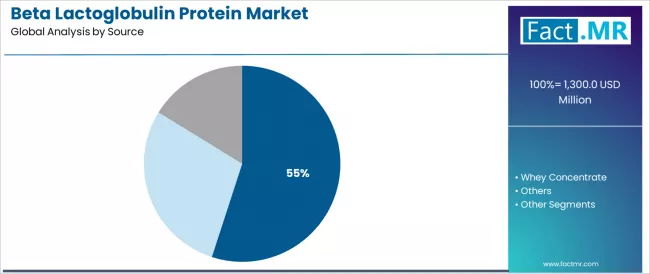
Market Position: Whey Isolate commands the leading position in the market with 55% market share through advanced purification features, including superior protein concentration characteristics, operational efficiency, and sports nutrition optimization that enable facilities to achieve optimal protein delivery across diverse nutrition and clinical applications.
Value Drivers: The segment benefits from facility preference for high-purity protein systems that provide consistent performance characteristics, reduced processing complexity, and operational efficiency optimization without requiring significant processing infrastructure modifications. Advanced design features enable automated protein control systems, purity monitoring, and integration with existing nutrition equipment, where operational performance and quality compliance represent critical facility requirements.
Competitive Advantages: Whey Isolate differentiates through proven operational reliability, consistent protein characteristics, and integration with automated facility management systems that enhance nutrition effectiveness while maintaining optimal protein quality standards for diverse sports and clinical applications.
Key market characteristics:
- Advanced purification designs with optimized protein concentration configuration and operational efficiency capabilities
- Enhanced nutrition effectiveness, enabling 85-90% protein purity consistency with reliable processing performance
- Sports nutrition facility compatibility, including automated monitoring systems, quality integration, and process optimization for protein control
Whey Concentrate Solutions Show Cost-Effective Market Growth
Whey Concentrate Solutions maintain a 35% market position in the market due to their enhanced cost-effectiveness properties and commercial application characteristics. These systems appeal to facilities requiring balanced performance with premium positioning for food processing and cost-sensitive nutrition applications. Market growth is driven by commercial segment expansion, emphasizing versatile protein solutions and operational efficiency through optimized processing designs.
Other Protein Sources Demonstrate Specialized Applications
Other protein sources capture 10% market share through specialized requirements in niche applications, alternative protein processing, and innovation-focused facilities. These operations demand certified protein systems capable of providing unique characteristics while delivering effective nutrition integration and quality performance capabilities.
By Application, Sports Nutrition Segment Shows Market Leadership
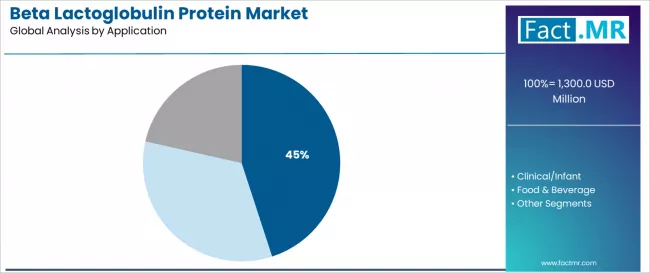
Market Context: Sports nutrition applications demonstrate market leadership in the market with 45% share due to widespread adoption of performance-enhancing systems and increasing focus on athlete optimization, nutritional cost efficiency, and sports applications that maximize performance while maintaining nutrition standards.
Appeal Factors: Sports operators prioritize protein consistency, performance efficiency, and integration with existing sports infrastructure that enables coordinated nutrition operations across multiple training sessions. The segment benefits from substantial sports investment and modernization programs that emphasize the acquisition of advanced protein systems for performance optimization and athlete nutrition applications.
Growth Drivers: Sports facility expansion programs incorporate beta lactoglobulin proteins as standard components for nutrition operations, while athletic growth increases demand for consistent protein capabilities that comply with sports standards and minimize performance disruption.
Clinical/Infant Applications Maintain Medical Demand
Clinical/infant applications capture 30% market share through comprehensive medical requirements in healthcare facilities, infant nutrition products, and clinical applications requiring reliable protein systems capable of meeting strict medical standards while providing effective nutrition integration and safety performance capabilities.
Food & Beverage Applications Show Commercial Integration
Food & Beverage applications account for 25% market share, including food processing facilities, beverage manufacturing operations, and commercial applications requiring specialized protein solutions for product optimization and quality enhancement.
By Form, Powder Format Shows Market Dominance
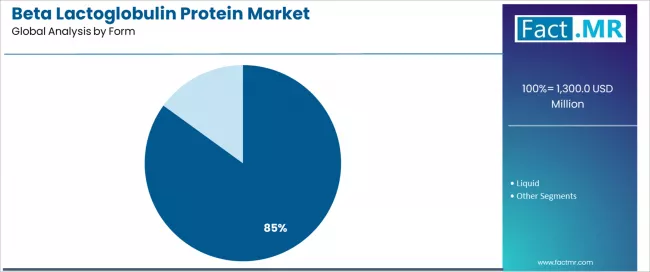
Market Context: Powder applications demonstrate market dominance in the market with 85% share due to widespread adoption of processing systems and increasing focus on storage optimization, handling cost efficiency, and manufacturing applications that maximize convenience while maintaining protein standards.
Appeal Factors: Manufacturing operators prioritize processing consistency, storage efficiency, and integration with existing production infrastructure that enables coordinated protein operations across multiple production runs. The segment benefits from substantial manufacturing investment and processing programs that emphasize the acquisition of powder-based systems for production optimization and ingredient handling applications.
Liquid Format Applications Maintain Specialized Demand
Liquid format applications capture 15% market share through specialized requirements in ready-to-use products, direct consumption applications, and convenience-focused products requiring liquid protein systems capable of immediate use while providing effective nutrition delivery and quality performance capabilities.
What are the Drivers, Restraints, and Key Trends of the Beta Lactoglobulin Protein Market?
| Category | Factor | Impact | Why It Matters |
|---|---|---|---|
| Driver | Sports nutrition expansion & athlete optimization (performance trends, training requirements) | ★★★★★ | Large-scale sports programs require efficient, standardized protein solutions with consistent performance and quality compliance across nutrition applications. |
| Driver | Clinical nutrition growth & healthcare development | ★★★★★ | Drives demand for specialized protein solutions and medical-grade capabilities; suppliers providing clinical-grade products gain competitive advantage. |
| Driver | Food safety regulations & protein standards (FDA compliance, quality control) | ★★★★☆ | Food processing facilities need certified, compliant protein solutions; demand for medical-grade formats expanding addressable market segments. |
| Restraint | Processing cost complexity & purification requirements | ★★★★☆ | Small facilities face investment pressure; increases cost sensitivity and affects protein consistency in budget-sensitive markets. |
| Restraint | Supply chain limitations & raw material availability | ★★★☆☆ | Quality-focused applications face challenges with sourcing adaptation and availability requirements, limiting adoption in cost-sensitive segments. |
| Trend | Personalized nutrition & targeted formulations (custom protein profiles) | ★★★★★ | Growing demand for customized protein solutions; personalization becomes core value proposition in premium nutrition segments. |
| Trend | Asian market expansion & regional nutrition growth | ★★★★☆ | Regional sports development drives demand for local protein solutions; regional processing capabilities drive competition toward localization. |
Analysis of the Beta Lactoglobulin Protein Market by Key Country
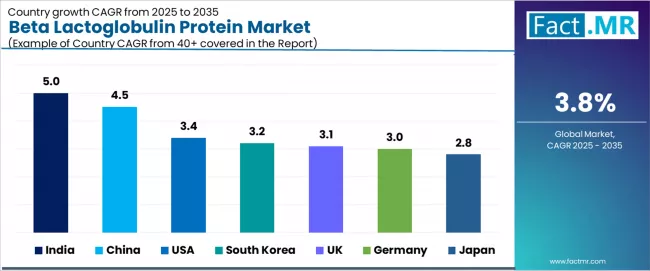
The market demonstrates varied regional dynamics with growth leaders including India (5.0% growth rate) and China (4.5% growth rate) driving expansion through sports nutrition initiatives and clinical capacity development. Steady Performers encompass USA (3.4% growth rate), South Korea (3.2% growth rate), and UK (3.1% growth rate), benefiting from established sports industries and advanced nutrition adoption. Mature Markets feature Germany (3.0% growth rate) and Japan (2.8% growth rate), where protein technology advancement and quality standardization requirements support consistent growth patterns.
Regional synthesis reveals South Asian and East Asian markets leading adoption through sports nutrition expansion and clinical development, while Western countries maintain steady expansion supported by technology advancement and regulatory standardization requirements. Emerging markets show strong growth driven by sports applications and nutrition modernization trends.
| Region/Country | 2025-2035 Growth | How to win | What to watch out |
|---|---|---|---|
| India | 5.0% | Focus on cost-effective sports solutions | Infrastructure challenges; processing availability |
| China | 4.5% | Lead with high-volume nutrition systems | Quality regulations; facility complexity |
| USA | 3.4% | Offer premium sports applications | FDA regulations; clinical requirements |
| South Korea | 3.2% | Provide performance-compliant systems | Technology saturation; facility costs |
| UK | 3.1% | Push clinical integration | Market maturation; cost pressures |
| Germany | 3.0% | Premium quality positioning | Over-specification; regulatory compliance |
| Japan | 2.8% | Industrial application solutions | Facility precision; market maturity |
India Drives Fastest Market Growth
India establishes fastest market growth through aggressive sports nutrition programs and comprehensive clinical capacity development, integrating advanced beta lactoglobulin protein as standard components in sports facility and healthcare installations. The country's 5.0% growth rate reflects government initiatives promoting sports modernization and healthcare development capabilities that mandate the use of advanced protein systems in nutrition facilities. Growth concentrates in major urban centers, including Maharashtra, Karnataka, and Tamil Nadu, where sports technology development showcases integrated protein systems that appeal to facilities seeking advanced nutrition optimization capabilities and performance enhancement applications.
Indian manufacturers are developing cost-effective protein solutions that combine domestic processing advantages with advanced nutritional features, including automated quality control systems and enhanced reliability capabilities. Distribution channels through sports nutrition suppliers and healthcare distributors expand market access, while government support for sports development supports adoption across diverse nutrition segments.
Strategic Market Indicators:
- Sports nutrition facilities leading adoption with 72% deployment rate in protein systems and performance enhancement sectors
- Government sports programs providing substantial funding for domestic protein technology development
- Local nutrition providers capturing 38% market share through competitive sourcing and localized technical support
- Export market development for cost-effective protein solutions targeting emerging sports markets
China Emerges as High-Volume Market
In Guangdong, Shanghai, and Beijing provinces, sports facilities and clinical centers are implementing advanced beta lactoglobulin protein as standard equipment for nutrition optimization and performance enhancement, driven by increasing government sports investment and healthcare modernization programs that emphasize the importance of protein capabilities. The market holds a 4.5% growth rate, supported by government nutrition initiatives and sports infrastructure development programs that promote advanced protein systems for athletic facilities. Chinese operators are adopting protein systems that provide consistent nutritional performance and quality compliance features, particularly appealing in sports regions where facility efficiency and protein standards represent critical operational requirements.
Market expansion benefits from growing sports processing capabilities and clinical integration agreements that enable domestic production of advanced protein systems for nutrition applications. Technology adoption follows patterns established in sports nutrition equipment, where performance and quality drive procurement decisions and operational deployment.
USA Shows Premium Sports Market Development
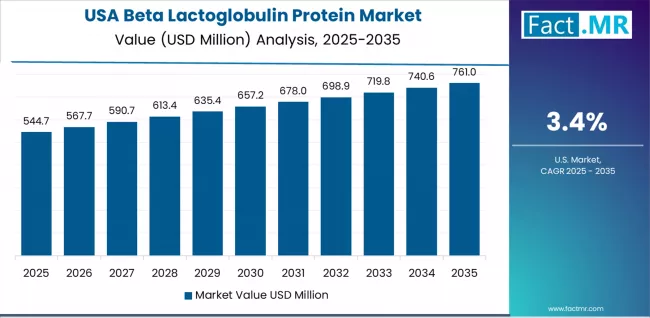
The USA establishes premium sports market development through comprehensive nutrition programs and established sports infrastructure, integrating beta lactoglobulin protein across athletic facilities and clinical applications. The country's 3.4% growth rate reflects mature sports industry relationships and established protein adoption that supports widespread use of protein systems in athletic facilities and performance-compliant operations. Growth concentrates in major sports centers, including California, Texas, and Florida, where sports technology showcases mature protein deployment that appeals to facilities seeking proven performance capabilities and nutritional efficiency applications.
American manufacturers leverage established distribution networks and comprehensive performance capabilities, including compliance programs and technical support that create customer relationships and operational advantages. The market benefits from mature sports standards and FDA requirements that mandate protein system use while supporting technology advancement and nutritional optimization.
South Korea Shows Performance Application Development
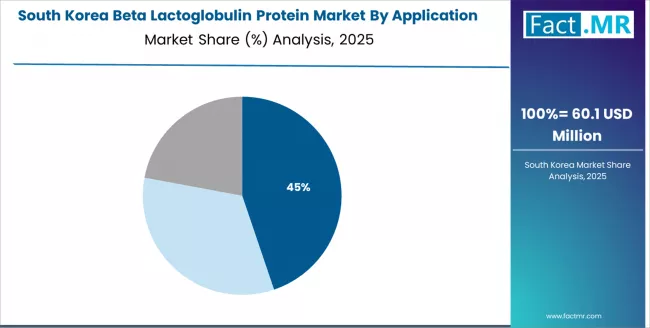
South Korea establishes performance application development through comprehensive facility modernization and technology integration, integrating beta lactoglobulin systems across sports facilities and specialized clinical applications. The country's 3.2% growth rate reflects growing sports investment and increasing adoption of protein technology that supports expanding use of protein systems in Korean athletic facilities. Growth concentrates in major athletic areas, including Seoul metropolitan area, Busan, and Incheon, where sports technology development showcases integrated protein systems that appeal to Korean facilities seeking advanced performance solutions with nutrition efficiency compatibility.
Korean manufacturers focus on maintaining quality standards while adopting sports nutrition efficiency, creating demand for systems that balance performance with operational advantages. The market benefits from strong athletic infrastructure and growing export opportunities that support protein technology adoption while maintaining quality standards important to Korean sports applications.
UK Demonstrates Clinical Integration
The UK's advanced nutrition technology market demonstrates sophisticated beta lactoglobulin protein integration with documented operational effectiveness in clinical applications and modern sports facilities through integration with existing healthcare systems and nutrition infrastructure. The country maintains a 3.1% growth rate, leveraging traditional clinical expertise and precision systems integration in protein technology. Clinical centers, including London, Manchester, and Birmingham, showcase premium installations where protein systems integrate with healthcare platforms and facility management systems to optimize clinical operations and maintain protein quality profiles.
British manufacturers prioritize clinical integration and operational consistency in protein development, creating demand for systems with advanced features, including healthcare monitoring and automated clinical systems. The market benefits from established healthcare infrastructure and commitment to clinical standards that provide long-term operational benefits and compliance with healthcare quality methods.
Germany Shows Technology Leadership
Germany's advanced nutrition technology market demonstrates sophisticated beta lactoglobulin protein deployment with documented operational effectiveness in sports applications and clinical facilities through integration with existing facility systems and nutrition infrastructure. The country leverages engineering expertise in protein technology and facility systems integration to maintain a 3.0% growth rate. Sports centers, including North Rhine-Westphalia, Bavaria, and Baden-Württemberg, showcase premium installations where protein systems integrate with comprehensive facility platforms and operational management systems to optimize sports operations and nutrition effectiveness.
German manufacturers prioritize system precision and EU compliance in protein development, creating demand for premium systems with advanced features, including facility monitoring integration and automated nutrition systems. The market benefits from established sports technology infrastructure and willingness to invest in advanced protein technologies that provide long-term operational benefits and compliance with international nutrition standards.
Japan Demonstrates Premium Quality Focus
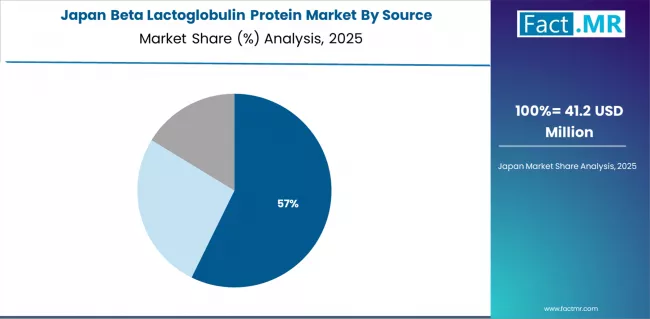
Japan's advanced nutrition technology market demonstrates sophisticated beta lactoglobulin protein integration with documented operational effectiveness in premium sports applications and modern clinical facilities through integration with existing quality systems and facility infrastructure. The country maintains a 2.8% growth rate, leveraging traditional quality expertise and precision systems integration in protein technology. Sports centers, including Tokyo, Osaka, and Nagoya, showcase premium installations where protein systems integrate with traditional quality platforms and modern facility management systems to optimize sports operations and maintain protein quality profiles.
Japanese manufacturers prioritize protein precision and quality consistency in development, creating demand for premium systems with advanced features, including quality monitoring and automated protein systems. The market benefits from established quality infrastructure and commitment to nutrition standards that provide long-term operational benefits and compliance with traditional quality preparation methods.
Europe Market Split by Country
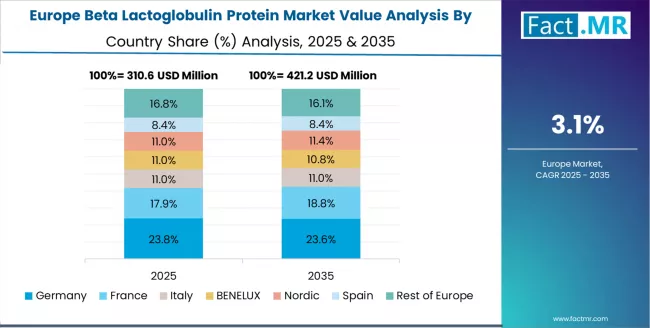
The European beta lactoglobulin protein market is projected to grow from USD 1,300.0 million in 2025, representing the total global market, with strong regional distribution across major economies. Germany is expected to maintain its leadership position with USD 280.0 million in 2025, accounting for 21.5% of the global market, supported by its advanced nutrition infrastructure and major sports centers.
United Kingdom follows with USD 200.0 million, representing 15.4% of the global market in 2025, driven by comprehensive clinical programs and sports technology development initiatives. France holds USD 160.0 million with 12.3% market share through specialized nutrition applications and clinical compliance requirements. Italy commands USD 120.0 million representing 9.2% share, while Spain accounts for USD 95.0 million or 7.3% in 2025. The rest of Europe region maintains USD 285.0 million, representing 21.9% of the global market, attributed to increasing protein adoption in Nordic countries and emerging sports facilities implementing nutrition modernization programs.
Competitive Landscape of the Beta Lactoglobulin Protein Market
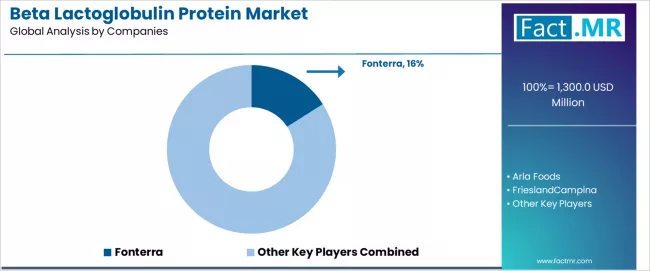
- Structure: ~15-20 active players; top 2-3 hold ~30-35% by revenue, with Fonterra leading at 14.0% market share.
- Leadership is maintained through: global distribution networks, specialized protein processing, and regional technical capabilities (multi-application versatility + quality support + regulatory compliance).
- What's commoditizing: standard whey processing functionality and basic concentration systems.
- Margin Opportunities: clinical-grade certifications, customized formulations, and comprehensive service contracts (quality assurance, technical support, compliance documentation).
| Stakeholder | What they actually control | Typical strengths | Typical blind spots |
|---|---|---|---|
| Global platforms | Distribution networks, broad product portfolios, processing facilities | Proven reliability, multi-region support, comprehensive quality | Technology refresh cycles; customer lock-in dependency |
| Technology innovators | R&D capabilities; advanced protein systems; processing interfaces | Latest technology first; attractive ROI on specialized applications | Service density outside core regions; customization complexity |
| Regional specialists | Local sourcing, fast delivery, nearby technical support | "Close to site" support; pragmatic pricing; local regulations | Technology gaps; talent retention in processing |
| Application-focused ecosystems | Industry expertise, technical support, specialized solutions | Lowest application variation; comprehensive industry support | Scaling costs if overpromised; technology obsolescence |
| Service specialists | Formulation programs, technical supply, quality training | Win service-intensive applications; flexible support | Scalability limitations; narrow market focus |
Key Players in the Beta Lactoglobulin Protein Market
- Fonterra
- Arla Foods
- FrieslandCampina
- Glanbia
- Lactalis
- Saputo
- Agropur
- Hilmar
- Kerry
- Carbery
- Milk Specialties
- DMV
- Davisco
- Volac
- Groupe Lactalis Ingredients
Scope of the Report
| Items | Values |
|---|---|
| Quantitative Units (2025) | USD 1,300.0 million |
| Source Type | Whey Isolate, Whey Concentrate, Others |
| Application | Sports Nutrition, Clinical/Infant, Food & Beverage |
| Form | Powder, Liquid |
| Regions Covered | South Asia Pacific, East Asia, Western Europe, North America, Latin America, Middle East & Africa |
| Countries Covered | India, China, USA, Japan, Germany, South Korea, United Kingdom, and 25+ additional countries |
| Key Companies Profiled | Fonterra, Arla Foods, FrieslandCampina, Glanbia, Lactalis, Saputo, Agropur, Hilmar |
| Additional Attributes | Dollar sales by source type and application categories, regional adoption trends across South Asia Pacific, East Asia, and Western Europe, competitive landscape with protein manufacturers and processing providers, facility preferences for protein consistency and nutritional reliability, integration with sports platforms and clinical monitoring systems, innovations in protein technology and purification enhancement, and development of advanced protein solutions with enhanced performance and nutrition optimization capabilities. |
Beta Lactoglobulin Protein Market by Segments
-
Source :
- Whey Isolate
- Whey Concentrate
- Others
-
Application :
- Sports Nutrition
- Clinical/Infant
- Food & Beverage
-
Form :
- Powder
- Liquid
-
Region :
- South Asia Pacific
- India
- ASEAN
- Australia & New Zealand
- Rest of South Asia Pacific
- East Asia
- China
- Japan
- South Korea
- Western Europe
- Germany
- France
- United Kingdom
- Italy
- Spain
- Rest of Western Europe
- North America
- United States
- Canada
- Mexico
- Latin America
- Brazil
- Rest of Latin America
- Middle East & Africa
- GCC Countries
- South Africa
- Rest of Middle East & Africa
- South Asia Pacific
Table of Content
- Executive Summary
- Global Market Outlook
- Demand to side Trends
- Supply to side Trends
- Technology Roadmap Analysis
- Analysis and Recommendations
- Market Overview
- Market Coverage / Taxonomy
- Market Definition / Scope / Limitations
- Market Background
- Market Dynamics
- Drivers
- Restraints
- Opportunity
- Trends
- Scenario Forecast
- Demand in Optimistic Scenario
- Demand in Likely Scenario
- Demand in Conservative Scenario
- Opportunity Map Analysis
- Product Life Cycle Analysis
- Supply Chain Analysis
- Investment Feasibility Matrix
- Value Chain Analysis
- PESTLE and Porter’s Analysis
- Regulatory Landscape
- Regional Parent Market Outlook
- Production and Consumption Statistics
- Import and Export Statistics
- Market Dynamics
- Global Market Analysis 2020 to 2024 and Forecast, 2025 to 2035
- Historical Market Size Value (USD Million) Analysis, 2020 to 2024
- Current and Future Market Size Value (USD Million) Projections, 2025 to 2035
- Y to o to Y Growth Trend Analysis
- Absolute $ Opportunity Analysis
- Global Market Pricing Analysis 2020 to 2024 and Forecast 2025 to 2035
- Global Market Analysis 2020 to 2024 and Forecast 2025 to 2035, By Source
- Introduction / Key Findings
- Historical Market Size Value (USD Million) Analysis By Source , 2020 to 2024
- Current and Future Market Size Value (USD Million) Analysis and Forecast By Source , 2025 to 2035
- Whey Isolate
- Whey Concentrate
- Others
- Y to o to Y Growth Trend Analysis By Source , 2020 to 2024
- Absolute $ Opportunity Analysis By Source , 2025 to 2035
- Global Market Analysis 2020 to 2024 and Forecast 2025 to 2035, By Application
- Introduction / Key Findings
- Historical Market Size Value (USD Million) Analysis By Application, 2020 to 2024
- Current and Future Market Size Value (USD Million) Analysis and Forecast By Application, 2025 to 2035
- Sports Nutrition
- Clinical/Infant
- Food & Beverage
- Y to o to Y Growth Trend Analysis By Application, 2020 to 2024
- Absolute $ Opportunity Analysis By Application, 2025 to 2035
- Global Market Analysis 2020 to 2024 and Forecast 2025 to 2035, By Form
- Introduction / Key Findings
- Historical Market Size Value (USD Million) Analysis By Form, 2020 to 2024
- Current and Future Market Size Value (USD Million) Analysis and Forecast By Form, 2025 to 2035
- Powder
- Liquid
- Y to o to Y Growth Trend Analysis By Form, 2020 to 2024
- Absolute $ Opportunity Analysis By Form, 2025 to 2035
- Global Market Analysis 2020 to 2024 and Forecast 2025 to 2035, By Region
- Introduction
- Historical Market Size Value (USD Million) Analysis By Region, 2020 to 2024
- Current Market Size Value (USD Million) Analysis and Forecast By Region, 2025 to 2035
- North America
- Latin America
- Western Europe
- Eastern Europe
- East Asia
- South Asia and Pacific
- Middle East & Africa
- Market Attractiveness Analysis By Region
- North America Market Analysis 2020 to 2024 and Forecast 2025 to 2035, By Country
- Historical Market Size Value (USD Million) Trend Analysis By Market Taxonomy, 2020 to 2024
- Market Size Value (USD Million) Forecast By Market Taxonomy, 2025 to 2035
- By Country
- USA
- Canada
- Mexico
- By Source
- By Application
- By Form
- By Country
- Market Attractiveness Analysis
- By Country
- By Source
- By Application
- By Form
- Key Takeaways
- Latin America Market Analysis 2020 to 2024 and Forecast 2025 to 2035, By Country
- Historical Market Size Value (USD Million) Trend Analysis By Market Taxonomy, 2020 to 2024
- Market Size Value (USD Million) Forecast By Market Taxonomy, 2025 to 2035
- By Country
- Brazil
- Chile
- Rest of Latin America
- By Source
- By Application
- By Form
- By Country
- Market Attractiveness Analysis
- By Country
- By Source
- By Application
- By Form
- Key Takeaways
- Western Europe Market Analysis 2020 to 2024 and Forecast 2025 to 2035, By Country
- Historical Market Size Value (USD Million) Trend Analysis By Market Taxonomy, 2020 to 2024
- Market Size Value (USD Million) Forecast By Market Taxonomy, 2025 to 2035
- By Country
- Germany
- UK
- Italy
- Spain
- France
- Nordic
- BENELUX
- Rest of Western Europe
- By Source
- By Application
- By Form
- By Country
- Market Attractiveness Analysis
- By Country
- By Source
- By Application
- By Form
- Key Takeaways
- Eastern Europe Market Analysis 2020 to 2024 and Forecast 2025 to 2035, By Country
- Historical Market Size Value (USD Million) Trend Analysis By Market Taxonomy, 2020 to 2024
- Market Size Value (USD Million) Forecast By Market Taxonomy, 2025 to 2035
- By Country
- Russia
- Poland
- Hungary
- Balkan & Baltic
- Rest of Eastern Europe
- By Source
- By Application
- By Form
- By Country
- Market Attractiveness Analysis
- By Country
- By Source
- By Application
- By Form
- Key Takeaways
- East Asia Market Analysis 2020 to 2024 and Forecast 2025 to 2035, By Country
- Historical Market Size Value (USD Million) Trend Analysis By Market Taxonomy, 2020 to 2024
- Market Size Value (USD Million) Forecast By Market Taxonomy, 2025 to 2035
- By Country
- China
- Japan
- South Korea
- By Source
- By Application
- By Form
- By Country
- Market Attractiveness Analysis
- By Country
- By Source
- By Application
- By Form
- Key Takeaways
- South Asia and Pacific Market Analysis 2020 to 2024 and Forecast 2025 to 2035, By Country
- Historical Market Size Value (USD Million) Trend Analysis By Market Taxonomy, 2020 to 2024
- Market Size Value (USD Million) Forecast By Market Taxonomy, 2025 to 2035
- By Country
- India
- ASEAN
- Australia & New Zealand
- Rest of South Asia and Pacific
- By Source
- By Application
- By Form
- By Country
- Market Attractiveness Analysis
- By Country
- By Source
- By Application
- By Form
- Key Takeaways
- Middle East & Africa Market Analysis 2020 to 2024 and Forecast 2025 to 2035, By Country
- Historical Market Size Value (USD Million) Trend Analysis By Market Taxonomy, 2020 to 2024
- Market Size Value (USD Million) Forecast By Market Taxonomy, 2025 to 2035
- By Country
- Kingdom of Saudi Arabia
- Other GCC Countries
- Turkiye
- South Africa
- Other African Union
- Rest of Middle East & Africa
- By Source
- By Application
- By Form
- By Country
- Market Attractiveness Analysis
- By Country
- By Source
- By Application
- By Form
- Key Takeaways
- Key Countries Market Analysis
- USA
- Pricing Analysis
- Market Share Analysis, 2024
- By Source
- By Application
- By Form
- Canada
- Pricing Analysis
- Market Share Analysis, 2024
- By Source
- By Application
- By Form
- Mexico
- Pricing Analysis
- Market Share Analysis, 2024
- By Source
- By Application
- By Form
- Brazil
- Pricing Analysis
- Market Share Analysis, 2024
- By Source
- By Application
- By Form
- Chile
- Pricing Analysis
- Market Share Analysis, 2024
- By Source
- By Application
- By Form
- Germany
- Pricing Analysis
- Market Share Analysis, 2024
- By Source
- By Application
- By Form
- UK
- Pricing Analysis
- Market Share Analysis, 2024
- By Source
- By Application
- By Form
- Italy
- Pricing Analysis
- Market Share Analysis, 2024
- By Source
- By Application
- By Form
- Spain
- Pricing Analysis
- Market Share Analysis, 2024
- By Source
- By Application
- By Form
- France
- Pricing Analysis
- Market Share Analysis, 2024
- By Source
- By Application
- By Form
- India
- Pricing Analysis
- Market Share Analysis, 2024
- By Source
- By Application
- By Form
- ASEAN
- Pricing Analysis
- Market Share Analysis, 2024
- By Source
- By Application
- By Form
- Australia & New Zealand
- Pricing Analysis
- Market Share Analysis, 2024
- By Source
- By Application
- By Form
- China
- Pricing Analysis
- Market Share Analysis, 2024
- By Source
- By Application
- By Form
- Japan
- Pricing Analysis
- Market Share Analysis, 2024
- By Source
- By Application
- By Form
- South Korea
- Pricing Analysis
- Market Share Analysis, 2024
- By Source
- By Application
- By Form
- Russia
- Pricing Analysis
- Market Share Analysis, 2024
- By Source
- By Application
- By Form
- Poland
- Pricing Analysis
- Market Share Analysis, 2024
- By Source
- By Application
- By Form
- Hungary
- Pricing Analysis
- Market Share Analysis, 2024
- By Source
- By Application
- By Form
- Kingdom of Saudi Arabia
- Pricing Analysis
- Market Share Analysis, 2024
- By Source
- By Application
- By Form
- Turkiye
- Pricing Analysis
- Market Share Analysis, 2024
- By Source
- By Application
- By Form
- South Africa
- Pricing Analysis
- Market Share Analysis, 2024
- By Source
- By Application
- By Form
- USA
- Market Structure Analysis
- Competition Dashboard
- Competition Benchmarking
- Market Share Analysis of Top Players
- By Regional
- By Source
- By Application
- By Form
- Competition Analysis
- Competition Deep Dive
- Fonterra
- Overview
- Product Portfolio
- Profitability by Market Segments (Product/Age /Sales Channel/Region)
- Sales Footprint
- Strategy Overview
- Marketing Strategy
- Product Strategy
- Channel Strategy
- Arla Foods
- FrieslandCampina
- Glanbia
- Lactalis
- Saputo
- Agropur
- Hilmar
- Kerry
- Carbery
- Milk Specialties
- DMV
- Davisco
- Volac
- Groupe Lactalis Ingredients
- Fonterra
- Competition Deep Dive
- Assumptions & Acronyms Used
- Research Methodology
List Of Table
- Table 1: Global Market Value (USD Million) Forecast by Region, 2020 to 2035
- Table 2: Global Market Value (USD Million) Forecast by Source , 2020 to 2035
- Table 3: Global Market Value (USD Million) Forecast by Application, 2020 to 2035
- Table 4: Global Market Value (USD Million) Forecast by Form, 2020 to 2035
- Table 5: North America Market Value (USD Million) Forecast by Country, 2020 to 2035
- Table 6: North America Market Value (USD Million) Forecast by Source , 2020 to 2035
- Table 7: North America Market Value (USD Million) Forecast by Application, 2020 to 2035
- Table 8: North America Market Value (USD Million) Forecast by Form, 2020 to 2035
- Table 9: Latin America Market Value (USD Million) Forecast by Country, 2020 to 2035
- Table 10: Latin America Market Value (USD Million) Forecast by Source , 2020 to 2035
- Table 11: Latin America Market Value (USD Million) Forecast by Application, 2020 to 2035
- Table 12: Latin America Market Value (USD Million) Forecast by Form, 2020 to 2035
- Table 13: Western Europe Market Value (USD Million) Forecast by Country, 2020 to 2035
- Table 14: Western Europe Market Value (USD Million) Forecast by Source , 2020 to 2035
- Table 15: Western Europe Market Value (USD Million) Forecast by Application, 2020 to 2035
- Table 16: Western Europe Market Value (USD Million) Forecast by Form, 2020 to 2035
- Table 17: Eastern Europe Market Value (USD Million) Forecast by Country, 2020 to 2035
- Table 18: Eastern Europe Market Value (USD Million) Forecast by Source , 2020 to 2035
- Table 19: Eastern Europe Market Value (USD Million) Forecast by Application, 2020 to 2035
- Table 20: Eastern Europe Market Value (USD Million) Forecast by Form, 2020 to 2035
- Table 21: East Asia Market Value (USD Million) Forecast by Country, 2020 to 2035
- Table 22: East Asia Market Value (USD Million) Forecast by Source , 2020 to 2035
- Table 23: East Asia Market Value (USD Million) Forecast by Application, 2020 to 2035
- Table 24: East Asia Market Value (USD Million) Forecast by Form, 2020 to 2035
- Table 25: South Asia and Pacific Market Value (USD Million) Forecast by Country, 2020 to 2035
- Table 26: South Asia and Pacific Market Value (USD Million) Forecast by Source , 2020 to 2035
- Table 27: South Asia and Pacific Market Value (USD Million) Forecast by Application, 2020 to 2035
- Table 28: South Asia and Pacific Market Value (USD Million) Forecast by Form, 2020 to 2035
- Table 29: Middle East & Africa Market Value (USD Million) Forecast by Country, 2020 to 2035
- Table 30: Middle East & Africa Market Value (USD Million) Forecast by Source , 2020 to 2035
- Table 31: Middle East & Africa Market Value (USD Million) Forecast by Application, 2020 to 2035
- Table 32: Middle East & Africa Market Value (USD Million) Forecast by Form, 2020 to 2035
List Of Figures
- Figure 1: Global Market Pricing Analysis
- Figure 2: Global Market Value (USD Million) Forecast 2020-2035
- Figure 3: Global Market Value Share and BPS Analysis by Source , 2025 and 2035
- Figure 4: Global Market Y to o to Y Growth Comparison by Source , 2025-2035
- Figure 5: Global Market Attractiveness Analysis by Source
- Figure 6: Global Market Value Share and BPS Analysis by Application, 2025 and 2035
- Figure 7: Global Market Y to o to Y Growth Comparison by Application, 2025-2035
- Figure 8: Global Market Attractiveness Analysis by Application
- Figure 9: Global Market Value Share and BPS Analysis by Form, 2025 and 2035
- Figure 10: Global Market Y to o to Y Growth Comparison by Form, 2025-2035
- Figure 11: Global Market Attractiveness Analysis by Form
- Figure 12: Global Market Value (USD Million) Share and BPS Analysis by Region, 2025 and 2035
- Figure 13: Global Market Y to o to Y Growth Comparison by Region, 2025-2035
- Figure 14: Global Market Attractiveness Analysis by Region
- Figure 15: North America Market Incremental Dollar Opportunity, 2025-2035
- Figure 16: Latin America Market Incremental Dollar Opportunity, 2025-2035
- Figure 17: Western Europe Market Incremental Dollar Opportunity, 2025-2035
- Figure 18: Eastern Europe Market Incremental Dollar Opportunity, 2025-2035
- Figure 19: East Asia Market Incremental Dollar Opportunity, 2025-2035
- Figure 20: South Asia and Pacific Market Incremental Dollar Opportunity, 2025-2035
- Figure 21: Middle East & Africa Market Incremental Dollar Opportunity, 2025-2035
- Figure 22: North America Market Value Share and BPS Analysis by Country, 2025 and 2035
- Figure 23: North America Market Value Share and BPS Analysis by Source , 2025 and 2035
- Figure 24: North America Market Y to o to Y Growth Comparison by Source , 2025-2035
- Figure 25: North America Market Attractiveness Analysis by Source
- Figure 26: North America Market Value Share and BPS Analysis by Application, 2025 and 2035
- Figure 27: North America Market Y to o to Y Growth Comparison by Application, 2025-2035
- Figure 28: North America Market Attractiveness Analysis by Application
- Figure 29: North America Market Value Share and BPS Analysis by Form, 2025 and 2035
- Figure 30: North America Market Y to o to Y Growth Comparison by Form, 2025-2035
- Figure 31: North America Market Attractiveness Analysis by Form
- Figure 32: Latin America Market Value Share and BPS Analysis by Country, 2025 and 2035
- Figure 33: Latin America Market Value Share and BPS Analysis by Source , 2025 and 2035
- Figure 34: Latin America Market Y to o to Y Growth Comparison by Source , 2025-2035
- Figure 35: Latin America Market Attractiveness Analysis by Source
- Figure 36: Latin America Market Value Share and BPS Analysis by Application, 2025 and 2035
- Figure 37: Latin America Market Y to o to Y Growth Comparison by Application, 2025-2035
- Figure 38: Latin America Market Attractiveness Analysis by Application
- Figure 39: Latin America Market Value Share and BPS Analysis by Form, 2025 and 2035
- Figure 40: Latin America Market Y to o to Y Growth Comparison by Form, 2025-2035
- Figure 41: Latin America Market Attractiveness Analysis by Form
- Figure 42: Western Europe Market Value Share and BPS Analysis by Country, 2025 and 2035
- Figure 43: Western Europe Market Value Share and BPS Analysis by Source , 2025 and 2035
- Figure 44: Western Europe Market Y to o to Y Growth Comparison by Source , 2025-2035
- Figure 45: Western Europe Market Attractiveness Analysis by Source
- Figure 46: Western Europe Market Value Share and BPS Analysis by Application, 2025 and 2035
- Figure 47: Western Europe Market Y to o to Y Growth Comparison by Application, 2025-2035
- Figure 48: Western Europe Market Attractiveness Analysis by Application
- Figure 49: Western Europe Market Value Share and BPS Analysis by Form, 2025 and 2035
- Figure 50: Western Europe Market Y to o to Y Growth Comparison by Form, 2025-2035
- Figure 51: Western Europe Market Attractiveness Analysis by Form
- Figure 52: Eastern Europe Market Value Share and BPS Analysis by Country, 2025 and 2035
- Figure 53: Eastern Europe Market Value Share and BPS Analysis by Source , 2025 and 2035
- Figure 54: Eastern Europe Market Y to o to Y Growth Comparison by Source , 2025-2035
- Figure 55: Eastern Europe Market Attractiveness Analysis by Source
- Figure 56: Eastern Europe Market Value Share and BPS Analysis by Application, 2025 and 2035
- Figure 57: Eastern Europe Market Y to o to Y Growth Comparison by Application, 2025-2035
- Figure 58: Eastern Europe Market Attractiveness Analysis by Application
- Figure 59: Eastern Europe Market Value Share and BPS Analysis by Form, 2025 and 2035
- Figure 60: Eastern Europe Market Y to o to Y Growth Comparison by Form, 2025-2035
- Figure 61: Eastern Europe Market Attractiveness Analysis by Form
- Figure 62: East Asia Market Value Share and BPS Analysis by Country, 2025 and 2035
- Figure 63: East Asia Market Value Share and BPS Analysis by Source , 2025 and 2035
- Figure 64: East Asia Market Y to o to Y Growth Comparison by Source , 2025-2035
- Figure 65: East Asia Market Attractiveness Analysis by Source
- Figure 66: East Asia Market Value Share and BPS Analysis by Application, 2025 and 2035
- Figure 67: East Asia Market Y to o to Y Growth Comparison by Application, 2025-2035
- Figure 68: East Asia Market Attractiveness Analysis by Application
- Figure 69: East Asia Market Value Share and BPS Analysis by Form, 2025 and 2035
- Figure 70: East Asia Market Y to o to Y Growth Comparison by Form, 2025-2035
- Figure 71: East Asia Market Attractiveness Analysis by Form
- Figure 72: South Asia and Pacific Market Value Share and BPS Analysis by Country, 2025 and 2035
- Figure 73: South Asia and Pacific Market Value Share and BPS Analysis by Source , 2025 and 2035
- Figure 74: South Asia and Pacific Market Y to o to Y Growth Comparison by Source , 2025-2035
- Figure 75: South Asia and Pacific Market Attractiveness Analysis by Source
- Figure 76: South Asia and Pacific Market Value Share and BPS Analysis by Application, 2025 and 2035
- Figure 77: South Asia and Pacific Market Y to o to Y Growth Comparison by Application, 2025-2035
- Figure 78: South Asia and Pacific Market Attractiveness Analysis by Application
- Figure 79: South Asia and Pacific Market Value Share and BPS Analysis by Form, 2025 and 2035
- Figure 80: South Asia and Pacific Market Y to o to Y Growth Comparison by Form, 2025-2035
- Figure 81: South Asia and Pacific Market Attractiveness Analysis by Form
- Figure 82: Middle East & Africa Market Value Share and BPS Analysis by Country, 2025 and 2035
- Figure 83: Middle East & Africa Market Value Share and BPS Analysis by Source , 2025 and 2035
- Figure 84: Middle East & Africa Market Y to o to Y Growth Comparison by Source , 2025-2035
- Figure 85: Middle East & Africa Market Attractiveness Analysis by Source
- Figure 86: Middle East & Africa Market Value Share and BPS Analysis by Application, 2025 and 2035
- Figure 87: Middle East & Africa Market Y to o to Y Growth Comparison by Application, 2025-2035
- Figure 88: Middle East & Africa Market Attractiveness Analysis by Application
- Figure 89: Middle East & Africa Market Value Share and BPS Analysis by Form, 2025 and 2035
- Figure 90: Middle East & Africa Market Y to o to Y Growth Comparison by Form, 2025-2035
- Figure 91: Middle East & Africa Market Attractiveness Analysis by Form
- Figure 92: Global Market - Tier Structure Analysis
- Figure 93: Global Market - Company Share Analysis
- FAQs -
How big is the beta lactoglobulin protein market in 2025?
The global beta lactoglobulin protein market is estimated to be valued at USD 1,300.0 million in 2025.
What will be the size of beta lactoglobulin protein market in 2035?
The market size for the beta lactoglobulin protein market is projected to reach USD 1,887.6 million by 2035.
How much will be the beta lactoglobulin protein market growth between 2025 and 2035?
The beta lactoglobulin protein market is expected to grow at a 3.8% CAGR between 2025 and 2035.
What are the key product types in the beta lactoglobulin protein market?
The key product types in beta lactoglobulin protein market are whey isolate, whey concentrate and others.
Which application segment to contribute significant share in the beta lactoglobulin protein market in 2025?
In terms of application, sports nutrition segment to command 45.0% share in the beta lactoglobulin protein market in 2025.